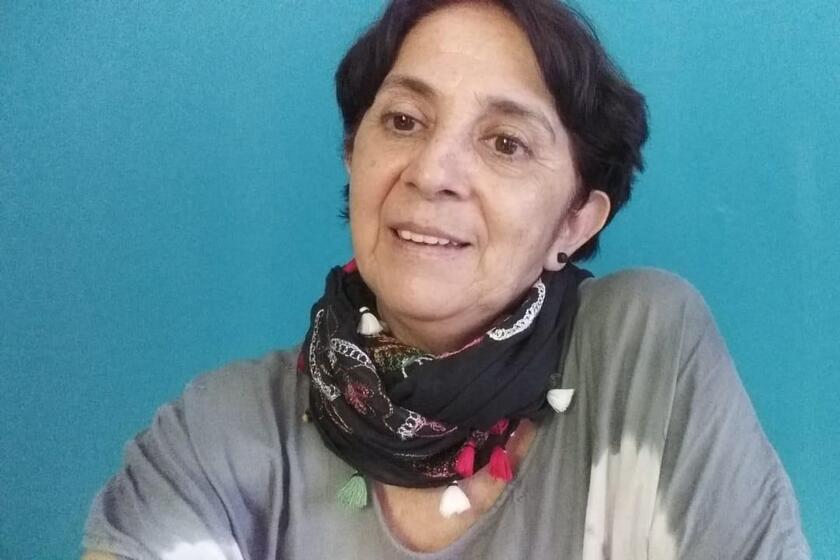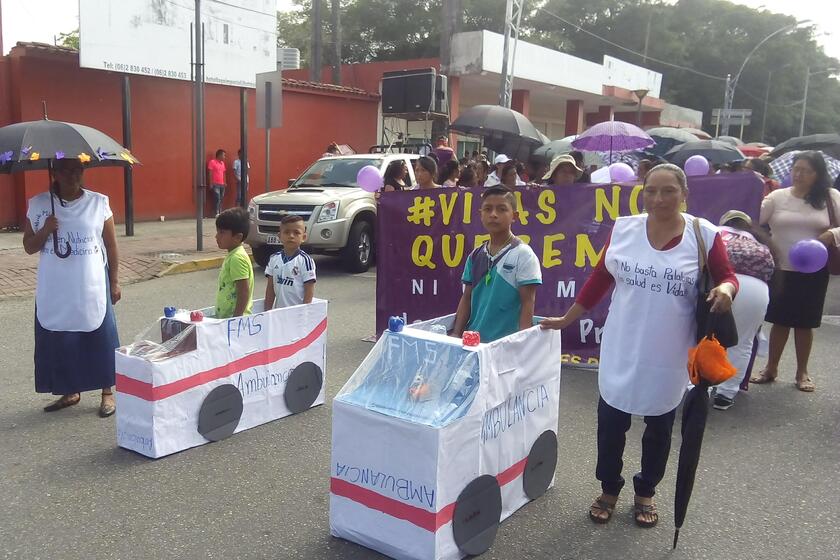Ecuador: "We experience more and more intra-family disruption"
Berlin / Quito, 25 November 2020
Amparo Peñaherrera works for our Ecuadorian partner organisation "Fundación de Mujeres de Sucumbíos" (FMS). As coordinator, she is responsible for measures to protect women from gender-based violence and its consequences. In an interview with our Head of Mission Sandra Weppler, she warns against the negative impact of the current Corona pandemic. For many women the situation has been clearly getting worse.

25 November is the International Day for the Elimination of Violence against Women. How widespread is gender-based violence in Ecuador?
The figures from a national survey on family relationships and gender-based violence are alarming. In the province of Sucumbíos, where our women's association works, seven out of ten women are survivors of gender-based violence, according to the INEC survey. At national level, the data are quite similar. In our women's shelter "Casa Amiga" we take in an average of 120 people per year, including children, young people and women. This year there was a 20 percent increase.
Gender-specific violence includes both violence against a person because of their gender and violence which disproportionately often affects people of a certain gender. Gender-specific violence can be of a physical, sexual or psychological nature or a combination of these forms. This includes domestic violence, sexual harassment and violence, as well as harassment on the internet. Gender-specific violence exists worldwide. Although both men and women are affected by gender-specific violence, the huge majority of victims are women.
How exactly do you help those affected?
We offer two basic services: One is the women's shelter "Casa Amiga", which offers protection to women, children and young people. Most of them became victims of domestic violence and had to flee their homes because their lives were in danger. This situation requires in-patient support. On the other hand we maintain the external care centre "La puerta violeta" (the purple door). Survivors of gender-based violence as well as children and young people who have been victims of incest receive interdisciplinary care in that place. Those who do not need to be accommodated in the "Casa Amiga" receive help. I have been responsible for the coordination of these areas for several years.

What impact does the Corona pandemic have on women?
The situation of many women has clearly deteriorated. Since the beginning of the lockdown, we have set up a day-care centre and a ludotheque. These are available to children and young people whose mothers have already left the shelter but cannot afford the cost of living on their own. It is important to understand that most women live in a very precarious situation. Many have not finished school and became mothers at a very young age, often as a direct consequence of sexual violence. Very few of them have a secure job and their income depends on selling fried bananas, meat or juice on the street. During the lockdown, they could no longer do all these things and we received calls from mothers who could no longer feed their children. Many could not pay their rent or cover the cost of basic services like electricity, gas and water. It was not even possible to stock up on supplies. We therefore supported them with food packages.
Under these circumstances and the restrictions: How were you still able to carry out your work and reach those affected?
I can really say that the lockdown was a decisive factor in our work. There was no support from local authorities, instead we had to introduce two shift system to meet the demand. Sometimes we did telework, sometimes we held face-to-face meetings in the women's shelter with very small groups. When the fear of the pandemic grew, we set up a hotline for the women's shelter and for the centre "La puerta violeta".
The worst thing is that many women were forced to live with their perpetrators again during the lockdown. I am horrified that since the beginning of the pandemic we have been experiencing more and more social disruption within the family; with children and young people being raped or fathers getting their daughters pregnant.
We are experiencing a total loss of ethics-based family structures. It has been a very difficult time for everyone.
Sucumbíos is a border province with Colombia and is located in the corridor for migration movements from Venezuela. Are migrant women even more vulnerable in such a situation?
Absolutely, because they are women without any support networks. That is why we are building these networks together. In connection with the campaign for 25 November, we have made a video that shows our work from the "embroidery rooms" as a way of art therapy. We are implementing this together with Ecuadorian and migrant women, all of whom are survivors of gender-based violence. It is a work of expression, of claiming rights and of building solid networks.
Background
The officially recognised Fundación de Mujeres de Sucumbíos - FMS (Federation of Women of Sucumbíos) is an association of 105 women's organisations with about 1,600 members. It was founded 30 years ago and its mission is to eliminate gender-based violence in all its forms of expression and to strengthening the socio-organisational structures of its member organisations. Based on national and international grants, FMS carries out a large number of projects focusing on gender equality and the promotion of women's rights. Johanniter has been in contact with FMS since 2009 and supports projects and activities that aim at strengthening organisations, preventing violence, improving health (including sexual and reproductive health) and promoting human rights.
Part two of our interview series
In Cambodia, we work together with our partner organisation "Women Peace Makers" to fight gender-specific violence. In our interview, Suyheang Kry, the head of the organisation, describes why gender-specific violence is so widespread in the Asian country and what her organisation does to combat it.
Part three of our interview series
In Uganda, we work together with our partner organisation "ACORD" to fight gender-specific violence. In our interview, Atwiine Muhindi Catherine, Programme Coordinator of the organisation tells us about the especially hard situation for refugees, as well as about the impacts of the Corona Pandemic and the lockdown.